This site contains affiliate links. If you make a purchase using one of these links, I may earn a small commission at no additional cost to you. Click here to read our full disclosure, including information about cookies collected and our privacy policy.
Spring and summer are such exciting times of the year! Feedstores display banners advertising baby chicks, and you can hear them peeping as soon as you enter the store. Even if we’re not currently shopping, we always have to take a look. Baby chicks are such cute little puffballs, and the store may have a new breed we’ve been looking at adding to our flock of egg-laying hens!
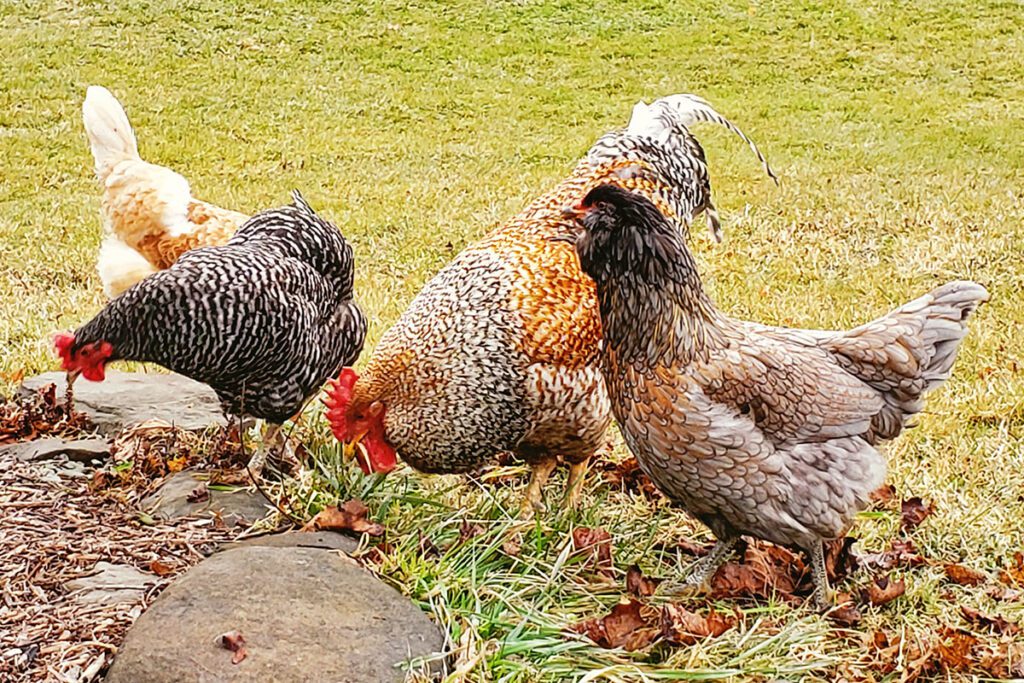
Over the years, we’ve owned many different breeds of chickens. All of them have their pros (and cons) but we keep coming back to a few types of laying hens that are favorites in our barnyard. I’ve put together a list of our favorite chicken breeds, in case you’re thinking of starting a new flock or adding to your existing one! P.S. Be sure to read to the end – I’ve added an extra breed that we’re super excited to add to our flock this year!
Our Favorite Breeds of Laying Hens
#1 Barred Plymouth Rock
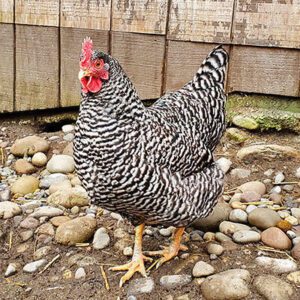
It’s hard to pick a single breed as our favorite, but Barred Plymouth Rocks (Barred Rocks for short) certainly make the shortlist.
This heritage breed was first developed in America and has been a favorite of chicken keepers since the late-1800s. Plymouth Rock chickens come in several color varieties, but the barred black and white pattern adds variety to our flock.
Barred rocks are considered a dual-purpose breed, raised for their eggs and meat. We love them for their large brown eggs, cold hardiness, and quiet temperament. They are always the first hens out of the coop in the morning and excel at free-ranging without being flighty. Internet research will tell you that these hens tend to go broody – but we’ve not found this to be the case. Overall, they are solid, dependable laying hens that will always have a place in our flock.
#2 Buff Orpington
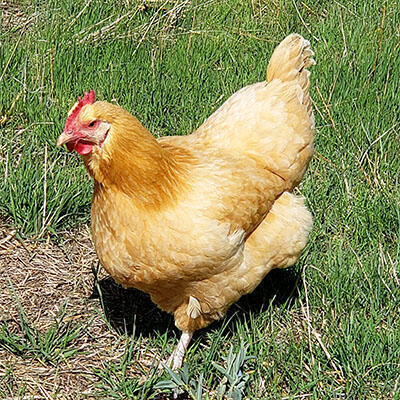
Another dependable heritage breed, Buff Orpingtons are big, fluffy, gold-colored hens. They are known for their gentle temperaments and are often the friendliest hens in the flock. They genuinely seem to like people, and will make friends with the other livestock, too.
The Orpington breed was developed in England in the late 1800s. They are a dual-purpose breed used for their large, light-brown eggs and meat production. They are also a fairly heavy breed. Roosters average 8-10lbs and mature hens weigh 6-8lbs. Their abundance of fluffy feathers makes them a great choice for colder climates.
Buff Orpington hens do tend to go broody once in a while. If you’re looking for a surrogate mother to new chicks, this may not be a bad thing!
#3 Speckled Sussex
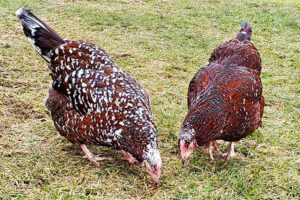
Speckled Sussex hens are a beautiful addition to any flock. Their dark brownish-red feathers are tipped with specks of white and black and they often grow more colorful with each molt.
Another English heritage breed, Speckled Sussex are quiet birds that do well in a barnyard or free-range setting. They don’t go broody often, but regularly lay brown eggs that sometimes have a pink or purple bloom.
In case you’re picking up on a theme – our favorite laying hens tend to be dual-purpose heritage breeds with quiet temperaments. No flighty chickens here, thank you!
#4 Ameraucana
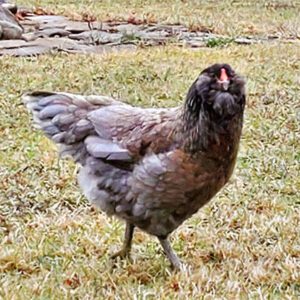
Ameraucana hens make the “favorites” list for one reason. Colorful eggs! Eggs from Ameraucana hens (sometimes called Easter Eggers) range from blue to green, and ocassionally pink. Each hen lays one color of egg, making a fun addition to your egg basket.
Ameraucanas are a fairly new breed, having been developed and improved from the Araucana breed. There are several pure-color varieties available, but many are mixed, so you rarely know how that newly hatched chick will feather out. One of their unique features are their puffy cheeks which are known as muffs. Some birds also have a beard, which is another puff of feathers under their beak.
These hens are the most active breed on this list. While they don’t crave human attention, they are fairly easygoing, and once you catch them they are friendly and well-mannered.
#5 Bielefelder – our newest addition!
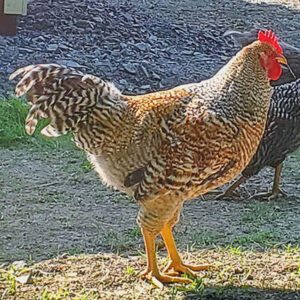
Full disclosure here: we ended up with our first Bielefelder chicken by mistake. I had picked up some Speckled Sussex pullets for our new flock, and to our surprise, the chick with a unique white spot on its head grew up to be a Bielefelder rooster!
As it turns out, Bielefelders are an auto-sexing breed. All the roosters are light brown chicks with white spots on their heads. The pullets resemble Speckled Sussex chicks.
We have been so happy with this gentle giant that I’m adding several Bielefelder pullets to our flock this spring. Any rooster that will fall asleep in my son’s lap waiting for 4-H showmanship is a winner in my book!
Based on our research into the breed, we expect the hens to be heavy-dual purpose birds who will lay large brown eggs. They should share our rooster’s gentle temperament and be a good addition to our farm flock.
There are a huge number of chicken breeds to suit any flock owner’s purposes. For our farm, we prefer heritage birds with quiet dispositions that are cold-hardy and good layers. If you have questions for us or a suggestion for another breed that would make a good addition to our farm feel free to email us.
You May Also Like:
- How to Choose the Right Livestock For Your Family
 Deciding when, how, and which livestock to add to your farm or homestead is a personal preference. Regardless of how big or small they are, all livestock come with chores,… Read more: How to Choose the Right Livestock For Your Family
Deciding when, how, and which livestock to add to your farm or homestead is a personal preference. Regardless of how big or small they are, all livestock come with chores,… Read more: How to Choose the Right Livestock For Your Family - Pregnant Goat Care (Countdown to Kidding)
 Trimming hooves, updating vaccinations, and providing mineral supplements are important to keep our does healthy during the last month of their pregnancy. This care is also important for the kids… Read more: Pregnant Goat Care (Countdown to Kidding)
Trimming hooves, updating vaccinations, and providing mineral supplements are important to keep our does healthy during the last month of their pregnancy. This care is also important for the kids… Read more: Pregnant Goat Care (Countdown to Kidding) - DIY Goat Kidding Pens
 Goat kidding pens are small pens, sized for a single doe and her newborn kids. This small pen provides a private space for a doe to give birth and bond… Read more: DIY Goat Kidding Pens
Goat kidding pens are small pens, sized for a single doe and her newborn kids. This small pen provides a private space for a doe to give birth and bond… Read more: DIY Goat Kidding Pens
